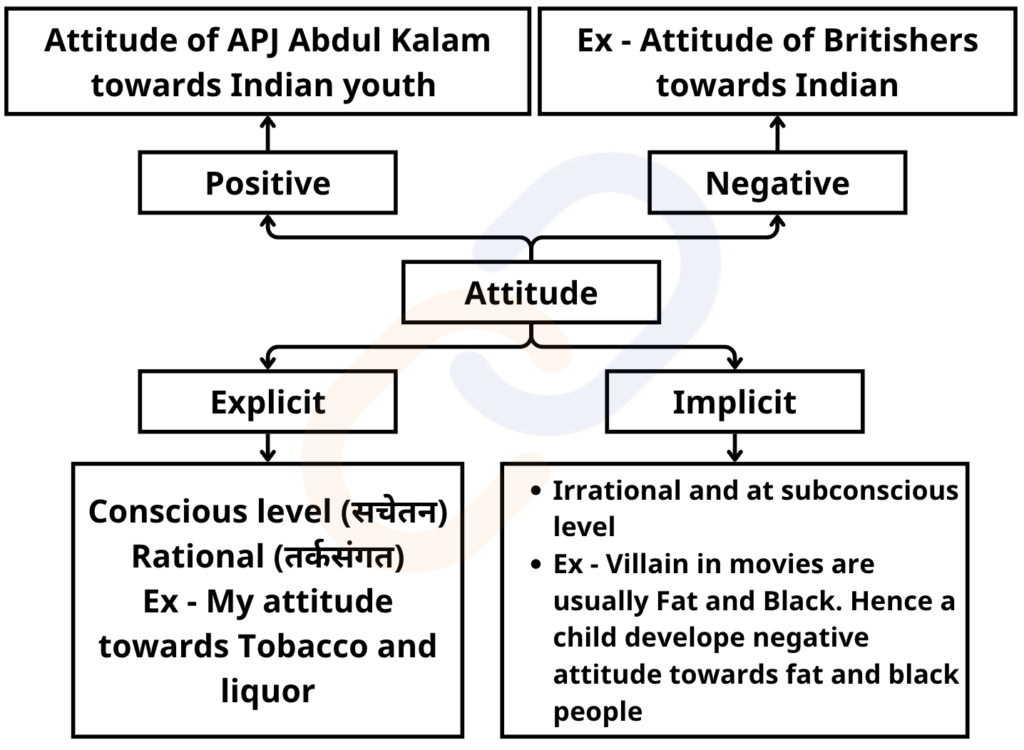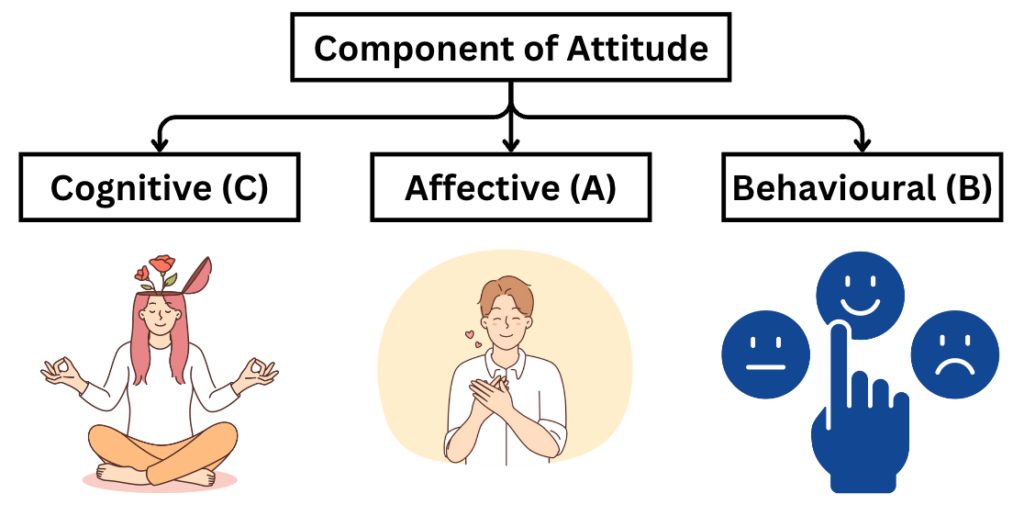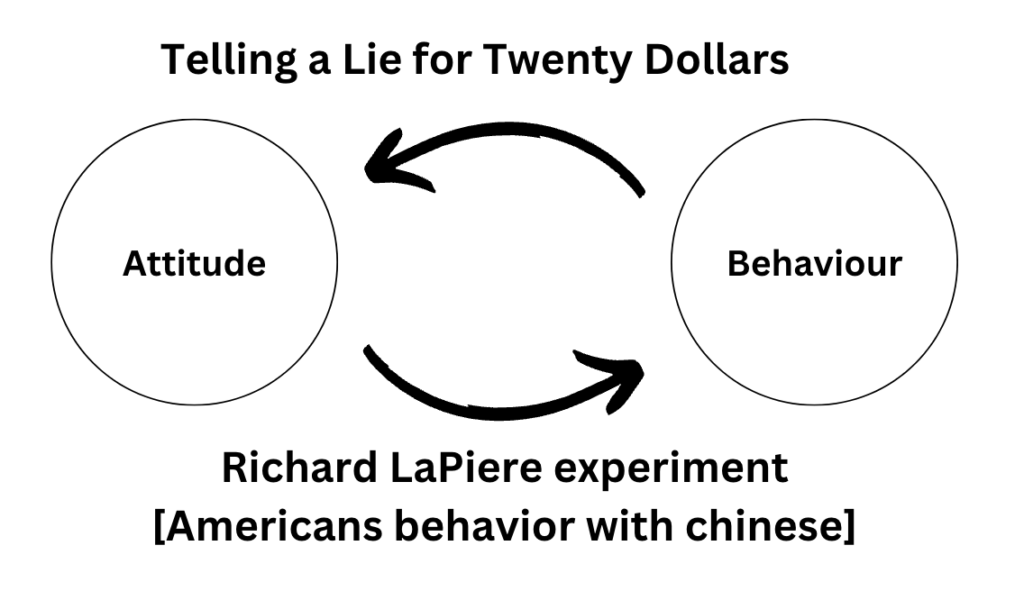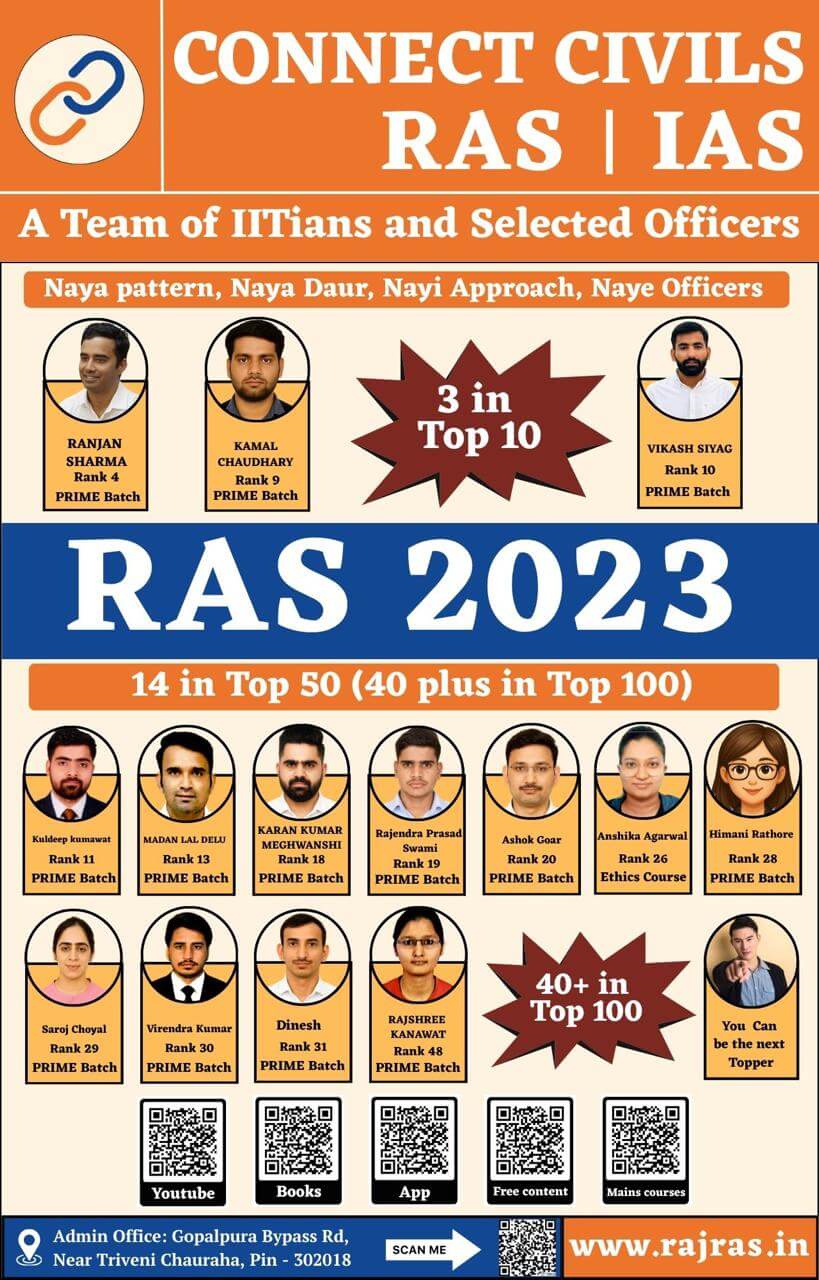Behavior, Moral and Political Attitudes of Administrators In the study of Ethics, understanding the behavior, moral values, and political attitudes of administrators is crucial for effective governance. These elements shape decision-making, influence public trust, and ensure that administrators uphold integrity and accountability in public service.
Previous Year Questions
Behaviour, Moral and Political attitudes of administrators
| Year | Question | Marks |
| 2018 | Political neutrality brings better administration. Discuss. | 5M |
Philosophical basis of Integrity
| Year | Question | Marks |
| 2016 | What do you understand about Integrity in Civil Service ? | 5M |
| 2018 | Explain the measures taken to enhance the integrity of administration in India. | 10M |
Behavior, Moral and Political attitudes of administrators
Attitude is the Psychological tendency to evaluate objects (People, things, events, ideas) with some degree of favor or disfavor.

Hierarchy or Stages of development of attitude towards any particular topic

Components of Attitude

Cognitive (Stereotype)
The beliefs, thoughts, and attributes that an individual associates with an object, person, issue, or situation. It involves the mental processes of understanding and interpreting information.
- Eg – 5000 INR fine for red light jump = negative attitude towards red light jumping
- Info about Climate change – Green drive
- Misinformation against Jews in Nazi germany = Negative attitude towards Jews
Affective (Hatred , Prejudiced)
It is the emotional or feeling segment of an attitude. It is related to the statement which affects another person. It deals with feelings or emotions that are brought to the surface about something, such as fear or hate.
- Eg.
- Feeling happy seeing greenery
- Ujalo Bhiwaro
- Disable -> Divyang
- Rape victim → Rape survivor
- Hatred towards Jews
Behavioural (Discrimination)
It reflects the behavioral intentions and actions resulting from the attitude. It pertains to how individuals are likely to behave towards the object of their attitude.
- Eg – Red light jump or not, overspeeding or not
- Eg – Tree plantation campaign [Shyam sundar jyani]
- Eg – Persecution of jews
Note – For a strong positive attitude, all three must be in congruence.
Behaviour and Attitude
- Attitude + Circumstances = Behaviour
Consistency in behaviour and attitude if-
- The attitude is strong, and occupies a central place in the attitude system.
- The person is aware of her/his attitude.
- There is very little or no external pressure for the person to behave in a particular way.
- The person’s behaviour is not being watched or evaluated by others.
- The person thinks that the behaviour would have a positive consequence, and therefore, intends to engage in that behaviour.

Example – Richard La Piere, an American social psychologist, conducted the following study. He asked a Chinese couple to travel across the United States, and stay in different hotels. Only once during these occasions they were refused service by one of the hotels. La Piere sent out questionnaires to managers of hotels and tourist homes in the same areas where the Chinese couple had traveled asking them if they would give accommodation to Chinese guests. A very large percentage said that they would not do so. This response showed a negative attitude towards the Chinese, which was inconsistent with the positive behavior that was actually shown towards the traveling Chinese couple. Attitudes may not always predict the actual pattern of one’s behavior.
Factors which decide how close is the relationship between attitude and behavior
- Influence
- Specificity – The extent to which attitude is focused on specific objects or situations.
- Self awareness – How far the individual is aware of his attitudes that he or she holds. As long as persons are not aware of their attitudes, these attitudes will tend to influence the individuals’ behaviours all the more intensely.
- Attitude Strength – The stronger the attitude is, the greater its impact on behaviour. Attitude formed through direct experience is stronger, and as a result, is better predictors of behaviour.
- Attitude Accessibility – It is the ease with which specific attitudes can be remembered and brought into consciousness.
Factors responsible for divergence
- Circumstances
- Social or external pressure
- Approval or disapproval of behaviour by respected individuals or groups
- External constraints
- Eg. – Swachh Bharat Mission (financial assistance, technical advice )
- Attitude strength
- If cognitive component is not strong then divergence
- Vested interests
- Time pressures
- Direct experience or second hand information
- Attitude formed as a result of central processing [route] is more likely to lead to a corresponding behaviour than peripheral processing.
- Consequences
Cognitive Dissonance Theory
- When an individual’s beliefs and attitude is not in harmony with his/her behaviour. He experiences psychological tension or discomfort. He is then motivated to reduce the dissonance through changes in behaviour or cognition.
- eg-
- Smoking despite knowing the health risks.
- Misrepresenting a product to a customer and wanting to be honest.
- Promoting Neon’s classes after getting paid with $1
Cognitive consistency Theor
- Cognitive consistency is the theory that people try to be consistent in their attitudes, views and in their behaviour.
- Eg. – You have a friend named Jeff who likes to smoke cigarettes regularly. After attending a lecture on the grave cause-effect relationship between smoking and cancer, he quits.
Ideal Behaviour of an Administrator
- Avoid conflict of interest or vested interests
- Strong value system
- Seek cognitive consistency = Psychological satisfaction
- Emotional intelligence (Self awareness)
- Best guide – Constitution, Laws, Rules, Good seniors (Role models)
- Keep the needs in limit.
Moral Attitude
- The moral perception of what is “right” and “wrong” or an attitude based on moral values is called moral attitude. It involves issues that need to be evaluated on ethical grounds.
- Moral attitude is the attitude we take towards moral issues.
- Example – Attitude towards a dowry person, child crime, employed women, honour of a philanthropic person, non-violence, live-in-relationship.
- Non-moral attitude – Attitude towards bungee jumping, attitude towards snake.
- Positive Moral Attitude – Altruism, welfare attitude, religious tolerance
- Negative Moral Attitude – Riots, religious extremism, terrorism, genocide, Intolerance.
- Factors which decide Moral Attitude –
- Culture
- Family
- Religion
- Education
- Circumstances
- Media
Moral attitude of an administrator
- Good attitude towards women empowerment or feminism –
- Better implementation of schemes like beti bachao beto pdhao, Sukanya samridhi yojana, special efforts for girl education, safety and security of women etc.
- Eg. – OPERATION ASMITA – By Collector Renu Jaipal to save dignity of women and daughters
- Good attitude towards poor and marginalized people –
- Administrative efficiency in PM Awas Yojana, PDS ration etc and values like empathy and compassion.
- Eg. – IAS officer Poma Tudu Trekked for 4 km to reach the tribal villages in Odisha.
- Eg. – Charan Paduka Abhiyaan by IAS J K Soni
- Good attitude towards democratic values –
- Respect for the rule of law, implementation of Fundamental rights like Article 14, protecting diversity (Schemes like Intangible heritage), promoting secularism etc
- Eg. – IAS T.N Seshan as Election commissioner.
- Bad attitude towards corruption –
- Zero tolerance towards unfair means like bribe, Scams, embezzlement, disproportionate assets etc.
- Eg. – IAS Ashok Khemka
- Bad attitude towards indiscipline –
- Efficiency, dedication, going beyond duty, proactiveness etc.
- Eg. – Metro man E Sreedharan
Political Attitude
- A relatively stable opinion that an individual or a group has about some politician, policy, law, event, political party or an issue in the public domain.
- Examples –
- Left vs right
- Women in Sabarimala
- Triple Talaq
- Relationship with Pakistan
- Whether demonetisation good/bad
- Farmer’s protest
- Socialism or capitalism
- Same sex marriage
- Examples of political viewpoints include conservatism, liberalism, socialism, libertarianism, and populism.

Factors Affecting political attitude
- Religion
- Caste – In India, People don’t cast their vote but vote their caste
- Class
- Culture
- Family
- Age
- Socio-economic condition
- Historical factors
- Geographical factors
- Social media
Types of political attitude
- Parochial – Prioritize local matters over national policies
- Subjective – Opinions based on emotions, personal beliefs, or loyalty to particular party or leaders, rather than facts
- Participative – Active engagement in the political process
- Assertive – Engage in lobbying, campaigning, or other forms of political activism
Ideal Political attitude of an administrator
- Politically neutral – Shri Nripendra Mishra (Played an important role in CM Mulayam Singh government, PM Manmohan Singh government and PM Narendra Modi government).
- Free from prejudice, biases, Favouritism, Nepotism and crony capitalism.
- Example – Ashok Khemka sir
- T N Seshan sir
- Coordination and cooperation with public representatives (MPs and MLAs)
- Implementation of govt policies in letter and spirit irrespective of political party in power.
Integrity
- The term integrity comes from the Latin word in-tangere, which means untouched (Hence uncompromisable principles).
- Strict adherence to moral principles irrespective of place, time and context (complete refusal to be compromised).
- Integrity is soundness of moral principles.
- Wisdom is knowing the right path, integrity is walking on it.
- Civil service conduct rules demand ‘absolute integrity’ . It will save you from any political pressure. If you are an upright officer who has never earned under the table, politicians know this. They will never have the courage to come to your office and make unfair demands. In bureaucracy, there are no secrets. But if they already know that Saahab khoob khaate hain (Officer makes money from unfair means), they will approach you. And in that case, the officer loses the moral authority to not entertain their corrupt demands. Not Every politician is evil and not every officer is a victim.
- An officer with integrity would never succumb to the pressure of seniors, relatives or any family member even if he/she has to compromise with personal relationships at that moment. He/she would do the right thing only because it is right.
- Integrity at the workforce increases efficiency of the organisation.
- It increases trust b/w various stakeholders.
- Helps in taking the most appropriate decision while in a dilemma. Avoid situations like conflict of interest.
Mahatma Gandhi –
- Chora Chori incident (called off NCM)
- Harmony in thought, Speech and action.
- He was ready to help Britishers in WW-II as it was against his moral principles to take advantage of the vulnerability of Britishers at that time. Also as a part of the empire, he thought it was the moral duty of India to help Britishers at that time while keeping the demand for freedom at highest priority.
Note – Integrity without knowledge is weak and useless, and knowledge without integrity is dangerous and dreadful.
Behavior Moral and Political attitudes of administrators
FAQ (Previous year questions)
Political neutrality between Flattery and hostility/hatred towards politicians.
Eg. – I don’t hate politicians. I hate bad politics – T.N. Seshan
Politically neutral – Shri Nripendra Mishra (Played an important role in CM Mulayam Singh government, PM Manmohan Singh government and PM Narendra Modi government).
Free from prejudice, biases, Favouritism, Nepotism and crony capitalism.
Example – Ashok Khemka sir
T N Seshan sir
Coordination and cooperation with public representatives (MPs and MLAs)
Implementation of govt policies in letter and spirit irrespective of political party in power
Political neutrality is one of the essential values of civil servants, as mentioned in the 2nd ARC. According to Aristotle, Political neutrality is a virtue between Flattery and hostility/hatred towards politicians.
Many administrative decisions are not free of political bias because –
Conflict of interest, greed, and corrupt practices (Hedonistic tendency) push an administrator to align her interests politically
Political ideology is dominating over one’s duty as a civil servant
The government in power belongs to a political party in a democratic system. Hence, populism is evident in policy implementation
Ex – Changing the name of the previous schemes by the new government
The government holds the power to transfer and promote civil servants
Ex – Frequent transfers of officers like Ashok Khemka and Durga Shakti Nagpal
But, most of them are politically neutral if –
Administrators are free from prejudice, bias, Favouritism, Nepotism, and crony capitalism
Following proper rules and regulations [Rule of law]
Ex – Following All India Services Conduct Rules 1968 and Rajasthan Civil Services Conduct Rules 1974
Knowledge of these laws empowers a civil servant [Socrates – Knowledge is the only virtue]. An ignorant civil servant will succumb to political pressure
Meet all the objective criteria [Fairness]
Role of the Civil Services Board in the transfer and promotion of bureaucrats
Does not involve any conflict of interest
Robust conflict‑of‑interest norms
Mandatory asset disclosure, cooling‑off periods before accepting private jobs
Ex – Shri Nripendra Mishra (Played an important role in the CM Mulayam Singh government, PM Manmohan Singh government and the PM Narendra Modi government).
Officers behold integrity and courage [Plato’s virtue] and act independently under constitutional & statutory bodies
Ex – T N Sheshan sir, the then chief election commissioner, exercised his power independently

